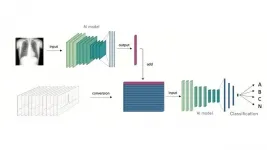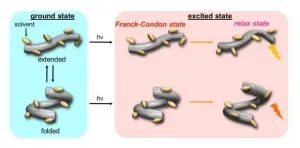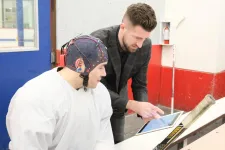(Press-News.org) Substantial proportions of pregnant and postpartum women scored high for symptoms of anxiety, depression, loneliness and post-traumatic stress in relation to COVID-19 in a survey carried out in May and June 2020, according to a new study published this week in the open-access journal PLOS ONE by Karestan Koenen and Archana Basu of Harvard T.H. Chan School of Public Health, US, and colleagues.
Pregnant and postpartum women face unique challenges during the COVID-19 pandemic that may put them at elevated risk of mental health problems. These include concerns about greater severity of COVID-19 disease, potential infection of newborns and increased risk of adverse neonatal outcomes. Perinatal mental health problems are a critical public health issue which can adversely impact not only women's own health but also infant outcomes, mother-infant bonding, and later offspring health.
In the new study, researchers carried out an anonymous, online, cross-sectional survey of pregnant and postpartum women in 64 countries between May 26, 2020 and June 13, 2020. The survey was available in twelve languages and was advertised in social media and online parenting forums. Participants gave information on demographics, COVID-19 exposure and worries, information seeking behavior, COVID-19 prevention behaviors, and mental health symptoms. The mental health symptoms reported in the study were based on modified screening questionnaires rather than a clinical diagnosis.
The study found that, of 6,894 participants, a substantial number scored at or above the cut-off for elevated anxiety/depression (2,138, or 31 percent), loneliness (3,691, or 53 percent), and post-traumatic stress in relation to COVID-19 (2,979, or 43 percent), despite the fact that only 117 women (2 percent) had been diagnosed with COVID-19 and only 510 (7 percent) had been in contact with someone with COVID-19. These numbers were higher than rates of post-traumatic stress, anxiety and depression previously reported for the general population during the pandemic, or for perinatal and postpartum women prior to the COVID-19 pandemic.
Information seeking from any source--including social media, news or word-of-mouth--five or more times a day was associated with more than twice the odds of elevated post-traumatic stress in relation to COVID-19 and anxiety/depression. For example, checking social media more than five times a day was associated with 2.25 times higher odds of elevated post-traumatic stress (95%CI 1.92-2.65) and 2.83 times higher odds of anxiety/depression (95%CI 2.39-3.34). In addition, being very worried about COVID-19 was strongly associated with elevated post-traumatic stress (OR 4.75, 95%CI 3.34-6.87) and anxiety/depression (OR 1.51, 95% CI 1.09-2.13). The majority of participants reported engaging in COVID-19 prevention behaviors (e.g., 93.3 percent reported practicing hand hygiene and 84.5 percent reported wearing a face mask) but these behaviors were not associated with anxiety/ depression symptoms. The authors suggest that COVID-19 prevention behaviors are central to containing the viral spread and mitigating physical health risk, but public health campaigns and medical care systems also need to explicitly address the impact of COVID-19 related stressors on mental health in perinatal women.
The authors add: "Our results suggest that globally, pregnant women and new moms' mental health is still another casualty of the COVID-19 pandemic. Maternal mental health and wellbeing is critical for mothers and foundational for healthy child development. There is an urgent need for maternal mental health to be fully integrated into standard prenatal and postpartum care."
INFORMATION:
Press-only preview: https://plos.io/3ekL6k2
Contact: Nicole Rura (Senior Media Relations Manager/Writer, Harvard T.H. Chan School of Public Health), nrura@hsph.harvard.edu, Ph.: 617-221-4241
Citation: Basu A, Kim HH, Basaldua R, Choi KW, Charron L, Kelsall N, et al. (2021) A cross-national study of factors associated with women's perinatal mental health and wellbeing during the COVID-19 pandemic. PLoS ONE 16(4): e0249780. https://doi.org/10.1371/journal.pone.0249780
Funding: Grant numbers awarded to each author 1R01HD102342 (AB, KCK) (Eunice Kennedy Shriver National Institute of Child Health and Human Development) NICHD: https://www.nichd.nih.gov/ The funders had no role in study design, data collection and analysis, decision to publish, or preparation of the manuscript.
Competing Interests: The authors have declared that no competing interests exist.
In your coverage please use this URL to provide access to the freely available article in PLOS ONE: https://journals.plos.org/plosone/article?id=10.1371/journal.pone.0249780
Time seems to pass more slowly in the UK COVID-19 lockdown - especially for people who are depressed, shielding or dissatisfied with social interactions
INFORMATION:
Article Title: Distortions to the passage of time during England's second national lockdown: A role for depression
Funding: The author received no specific funding for this work.
Competing Interests: The authors have declared that no competing interests exist.
Article URL: https://journals.plos.org/plosone/article?id=10.1371/journal.pone.0250412
...
Survey of 3,536 healthcare workers suggests 67 percent are suffering burnout, but people who receive frequent COVID-19 tests are less likely to be burned out.
INFORMATION:
Article Title: Determinants of burnout and other aspects of psychological well-being in healthcare workers during the Covid-19 pandemic: A multinational cross-sectional study
Funding: JK has received an educational grant from Johnson and Johnson.
Competing Interests: JK has received an educational grant from Johnson and Johnson. This does not alter our adherence to PLOS ONE ...
Kobe University Hospital's Dr. NISHIMORI Makoto and Project Assistant Professor KIUCHI Kunihiko et al. (of the Division of Cardiovascular Medicine, Department of Internal Medicine) have developed an AI that uses multiple kinds of test data to predict the location of surplus pathways in the heart called 'accessory pathways', which cause the heart to beat irregularly. In this study, the researchers were able to improve diagnosis accuracy by having the AI learn from two completely different types of test results- electrocardiography (ECG) data and X-ray images. It is hoped that this methodology can be applied to other disorders based upon the successful results of this research.
These ...
Stimulus-responsive supramolecular structures have emerged as an alternative to conventional ones, owing to their applications in sensing, drug delivery, and switchable memory systems. Now, scientists at Tokyo Institute of Technology explore the hydrostatic-pressure response of "foldamers"--artificial molecules that mimic protein folding--and report a shift in their preferred conformation with changing pressure, demonstrating hydrostatic pressure-enabled dynamic control. The finding opens doors to future development of pressure-sensitive foldamers and artificial materials.
Most, if not all, biological systems are extremely complex and often rely on interactions traditional ...
Animals use their sense of smell to navigate the world--to find food, sniff out mates and smell danger. But when a hungry animal smells food and a member of the opposite sex at the same time, what makes dinner the more attractive option? Exactly what is it about the odor of food that says, "Choose me?"
Research by investigators at Harvard Medical School illuminates the neurobiology that underlies food attraction and how hungry mice choose to pay attention to one object in their environment over another.
In their study, published March 3 in Nature, Stephen Liberles and co-author Nao Horio, identified the pathway that promotes attraction ...
STUDY SHOWS VACCINES MAY PROTECT AGAINST NEW COVID-19 STRAINS ... AND MAYBE THE COMMON COLD
A new study by Johns Hopkins Medicine researchers provides evidence that CD4+ T lymphocytes -- immune system cells also known as helper T cells -- produced by people who have received either of the two messenger RNA (mRNA) vaccines for COVID-19 caused by the original SARS-CoV-2 strain also will recognize the mutant variants of the coronavirus that are rapidly becoming the dominant types worldwide.
The researchers say this suggests that T cell responses elicited or enhanced by the vaccines should be able to control the current ...
Surrey, B.C. Canada and Rochester, Minn., U.S. (April 22, 2021) - Neuroscience researchers at Mayo Clinic Orthopedics and Sports Medicine in Rochester, Minnesota, U.S., the Health and Technology District and Simon Fraser University (SFU) in Surrey, British Columbia, Canada have published the latest results of their ongoing multi-year hockey concussion study examining changes in subconcussive cognitive brain function in male youth ice hockey players.
The research team monitored brain vital signs during pre- and post-season play in 23 Bantam (age 14 or under) and Junior A (age 16 to 20) male ice-hockey players in Rochester, Minnesota.
"Brain vital signs" translates complex ...
Plastics are a part of nearly every product we use on a daily basis. The average person in the U.S. generates about 100 kg of plastic waste per year, most of which goes straight to a landfill. A team led by Corinne Scown, Brett Helms, Jay Keasling, and Kristin Persson at Lawrence Berkeley National Laboratory (Berkeley Lab) set out to change that.
Less than two years ago, Helms announced the invention of a new plastic that could tackle the waste crisis head on. Called poly(diketoenamine), or PDK, the material has all the convenient properties of traditional plastics while avoiding the environmental pitfalls, because unlike traditional plastics, PDKs can be recycled indefinitely ...
Living away from community and country, Aboriginal families of children with severe burns also face critical financial stress to cover the associated costs of health care and treatment, a new study shows.
An Australian study, led by Flinders researchers Dr Courtney Ryder and Associate Professor Tamara Mackean, found feelings of crisis were common in Aboriginal families with children suffering severe burns, with one family reporting skipping meals and others selling assets to reduce costs while in hospital.
The economic hardship was found to be worse in families who live in rural areas - some households travelling more ...
Rising levels of dementia is putting pressure on residential aged care facilities, including in rural and regional centres where nursing homes and staff are already under pressure.
Now a pilot program of personalised interventions, including residents' favourite songs, has been shown to make a big difference to dementia behaviours, drug use and carers' wellbeing.
Harmony in the Bush, a study led by Flinders University in five nursing homes in Queensland and South Australia, developed a multimodal person-centred non-pharmacological intervention program incorporating ...




